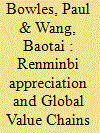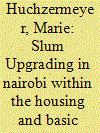|
|
|
Sort Order |
|
|
|
Items / Page
|
|
|
|
|
|
|
| Srl | Item |
| 1 |
ID:
120671


|
|
|
|
|
| Publication |
2013.
|
| Summary/Abstract |
By triggering a wave of organisational restructuring, reconfiguration of supply chains and consolidation of business processes at multinational companies, the crisis offered significant upgrading opportunities for peripheral actors in globalised production networks (the so-called global value chains). Drawing on Hungarian case studies of local subsidiaries in the automotive and electronics industries, this essay investigates the crisis-induced product, process and functional upgrading opportunities in low-cost locations. We show Hungary's high level of integration into global value chains and document the rapidly ongoing process of functional upgrading.
|
|
|
|
|
|
|
|
|
|
|
|
|
|
|
|
| 2 |
ID:
103489


|
|
|
|
|
| Publication |
2011.
|
| Summary/Abstract |
Gaseous biofuels including biomethane, which has been shown to be more environmentally beneficial than liquid biofuels, should contribute to meeting the challenging UK targets set for the supplying of biofuels to the road transport fuel market. Under the Renewable Transport Fuel Obligations the financial incentives for the supply of biofuels have been volatile, e.g. 2008/2009 saw Renewable Transport Fuel Certificate values fall to zero. Any shortfall from the maximum value has significant implications for all biofuels. It is demonstrated that biomethane can be produced at a cost which is competitive with liquid biofuels and fossil fuels within the UK. Technologies such as water scrubbing, pressure swing adsorption and physical and chemical absorption are available to upgrade biogas generated by anaerobic digestion of organic wastes to transport fuel quality, and technologies such as membrane separation and cryogenic distillation are being modified for such an application. The manufacture and sale of biomethane as a transport fuel is also financially competitive with Combined Heat and Power. One limiting factor may be the additional cost of purchasing and maintaining biomethane fuelled vehicles. Support in this area could lead to the rapid expansion of biomethane transport fuel infrastructure and bring significant long term environmental and economic advantages.
|
|
|
|
|
|
|
|
|
|
|
|
|
|
|
|
| 3 |
ID:
160822


|
|
|
|
|
| Summary/Abstract |
Addressing intertwined socio-economic and environmental problems in informal urban areas underscores the need for just sustainability. The co-production of urban housing provides a useful domain to link issues related to sustainability with social and environmental justice. Using the example of an informal settlement re-blocking project, this paper shows how co-production as an approach might or might not promote principles ingrained in just sustainability. The study relied on data collected through semi-structured interviews with residents and key informants as well as transect walks within the settlement. The case shows that working towards just sustainability is not straight-forward. It demands efforts that navigate, with foresight rather than hindsight, the dynamics in multi-scalar contexts into which informal settlements are embedded. Social and institutional structures, processes and relationships producing and reproducing material distribution are crucial to entrenching the just sustainability praxis.
|
|
|
|
|
|
|
|
|
|
|
|
|
|
|
|
| 4 |
ID:
077225


|
|
|
|
|
| Publication |
2007.
|
| Summary/Abstract |
Through a comparative, longitudinal analysis of the wine industry in two Argentine provinces, this article finds that different political approaches to reform and not simply socioeconomic endowments determine the ability of societies to build new institutions for economic upgrading. A "depoliticization" approach emphasizes the imposition of arm's-length incentives by a powerful, insulated government but exacerbates social fragmentation and impedes upgrading. A "participatory restructuring" approach promotes the creation and maintenance of new public-private institutions for upgrading via rules of inclusive membership and multiparty, deliberative governance. This latter approach can facilitate collaboration and knowledge creation among the government and previously isolated, even antagonistic, stakeholder groups.
|
|
|
|
|
|
|
|
|
|
|
|
|
|
|
|
| 5 |
ID:
157885


|
|
|
|
|
| Summary/Abstract |
China has experienced a rapid integration into Global Value Chains and a decade long appreciation of its exchange rate. However, these trends have been analysed largely in isolation from each other. In this paper, we explore the linkages between the two based on interviews with a sample of firms in Jiangsu Province. We show (1) how the distribution of the costs and benefits of exchange rate appreciation depends on the power hierarchies between firms in GVCs; (2) how exchange rate changes are important drivers of upgrading and even downgrading in GVCs; and (3) that the firm heterogeneity evident in GVCs provides additional insights into the politics of exchange rate determination in China.
|
|
|
|
|
|
|
|
|
|
|
|
|
|
|
|
| 6 |
ID:
191858


|
|
|
|
|
| Summary/Abstract |
In South Africa, informal rental accommodation constructed in the backyards of formal houses is the fastest growing housing segment. These backyard dwellings (BDs) are makeshift structures made from timber frames, metal sheets or wooden planks. Despite the proliferation of BDs, national and local governments have done little to improve the living standards of backyard dwellers. The research uses focus groups, interviews and building surveys to examine the current state of backyard dwellings and identify opportunities and barriers for government interventions. We analyse the barriers to home improvements, highlighting the important role of tenant dignity and landlord-tenant relations. Furthermore, the research discusses the challenges of potential government-led interventions, which could easily fail in the context of resistance, mistrust and anxiety over housing. We present four key considerations that any intervention to upgrade BDs in South Africa or similar rental units in other localities must consider.
|
|
|
|
|
|
|
|
|
|
|
|
|
|
|
|
| 7 |
ID:
081712


|
|
|
|
|
| Publication |
2008.
|
| Summary/Abstract |
This article addresses the high level of commercialization of shelter and basic services in Nairobi, and its implication for slum upgrading in Kenya. The article is based on a review of published and grey literature, and on qualitative interviews with slum residents as well as with landlords, tenants and stakeholders in Nairobi's multi-storey tenements. The Kenyan government's conceptualization of slum upgrading inserts benefits into a highly distorted market, preventing a balanced realization of the internationally recognized elements of the right to housing, and raising fears of displacement among slum residents. An analysis of the wider tenement market confirms these fears, and suggests that market distortions must be addressed in order for slum upgrading to succeed
|
|
|
|
|
|
|
|
|
|
|
|
|
|
|
|
|
|
|
|
|